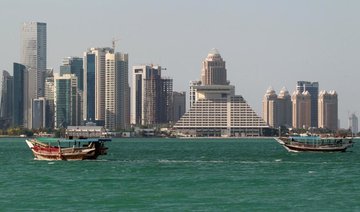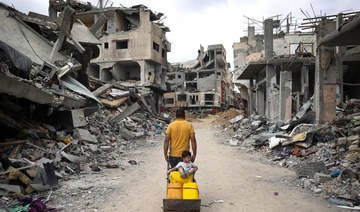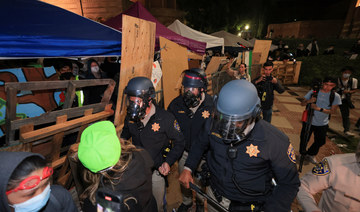WASHINGTON: The United States and Qatar on Tuesday inked a deal to resolve a years-old quarrel over alleged airline subsidies, as Qatar’s government works to defuse tensions with the Trump administration.
A formal announcement came Tuesday, as Secretary of State Rex Tillerson and Defense Secretary Jim Mattis hosted the inaugural round of the US-Qatar strategic dialogue. Agreements, on security and counter-terrorism cooperation and combatting human trafficking, were also signed.
“Qatar is a strong partner and long-time friend of the United States,” Tillerson said, welcoming the agreements. Tuesday’s meeting follows harsh criticism of Qatar from President Donald Trump. He denounced the country last year for allegedly funding terrorism amid a row between the country and other members of the Gulf Cooperation Council, who have imposed a land, sea and air blockade on it.
Qatar hopes to change that narrative by enhancing counterterrorism cooperation and allowing greater US visibility into its finances and banking practices.
Tillerson and Mattis said the US remains deeply concerned about the situation as it nears its eight-month mark, including hostile “rhetoric and propaganda” being employed. They called on all parties to the dispute to renew efforts to end it.
Qatar is home to a major US military base that is key to the fight against Daesh in Iraq and Syria and Mattis said that “a united GCC bolsters our effectiveness on many fronts.”
The aviation agreement will see state-owned Qatar Airways agree voluntarily to open up its accounting books. US airlines say the company receives billions of dollars in government payments that leave them at a competitive disadvantage. Qatar also made a loose commitment that the flag carrier won’t launch flights to the United States from Europe or other non-Qatari cities, creating yet more competition for the US airlines.
Both sides of the dispute can claim the agreement as a victory — for very different reasons.
The US airline industry can claim the increased transparency will create a powerful disincentive to unfair subsidies, as Qatar will no longer be able to mask such payments through creative accounting. The three major US carriers — Delta Air Lines, American Airlines and United Airlines — have spent huge sums over the last three years pressing the Obama administration and Trump administration for tough action. They’re eager to show a win.
Yet for Qatar, the agreement averts the more serious step US airlines wanted: re-opening the so-called open-skies treaties that could lead to less favorable conditions for Arabian Gulf airlines. And, it means that Qatar can also show it’s cooperating closely and productively with US regulators.
That could help the tiny gas-rich kingdom draw a contrast with the United Arab Emirates, whose two airlines are also accused of improper subsidies but have yet to reach an agreement with Washington.
“Everybody gets to claim victory in this,” said Helane Becker, an airline analyst for Cowen and Co.
Indeed, even before the announcement, American, the world’s biggest airline by passenger traffic, praised the deal as a way to “thoughtfully address” Qatari subsidies. And United CEO Oscar Munoz applauded the agreement while thanking Trump’s administration for “effectively representing the interests of the American aviation industry.”
In an eight-paragraph document laying out “understandings” between Qatar and the US, the Gulf nation commited within one year to releasing audited financial statements for Qatar Airlines “in accordance with internationally-recognized accounting standards.” Within two years, Qatar Airways is to disclose any transactions with other state-owned entities, such as caterers or other companies that support airline operations.
A side-letter to the agreement stated that Qatar’s civilian aviation authority is unaware of any plans by Qatar Airlines to start so-called “Fifth Freedoms” flights — routes from third countries to the United States. Under the scenario US airlines fear, Qatar Airways could offer flights from its Doha hub to, say, Paris or London, stop to pick up more passengers, then fly on to New York.
The side-letter only says there are no current plans to operate such service. That’s short of a binding guarantee. There’s also no commitment Qatar Airways won’t expand its offering of Qatar-US flights.
“This appears to be the administration essentially throwing a meatless bone to the three US carriers to put an end to their rants against the Gulf carriers,” said John Byerly, who was the chief open skies negotiator in the Obama administration and has also consulted for Emirates Airline and UPS.
The two UAE airlines — Dubai-based Emirates and Abu Dhabi-based Etihad Airways — aren’t a party to the US-Qatar agreement. Emirates Airline currently offers “Fifth Freedom” flights in which passengers can fly from New York-area airports to Milan, Italy or Athens without ever setting foot in the UAE.
All three Gulf airlines have long denied receiving unfair government subsidies. There was no immediate reaction from either Emirates or Etihad.
US, Qatar reach agreement on subsidy spat with airlines
US, Qatar reach agreement on subsidy spat with airlines

Palestinian Embassy seeks temporary status for Gazans who entered Egypt during war
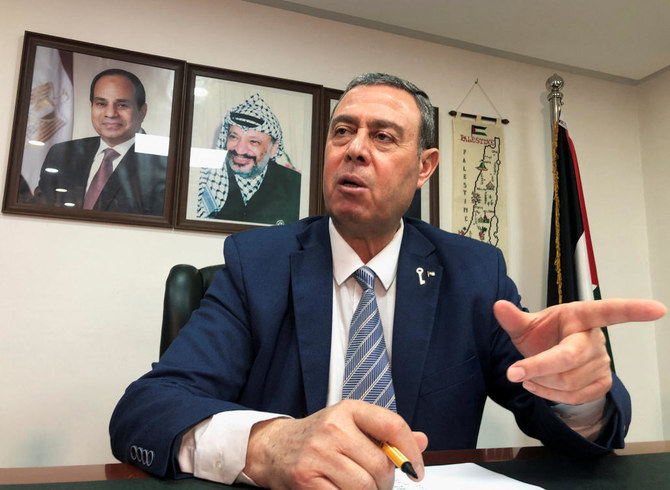
Diab Al-Louh, the Palestinian ambassador in Cairo, said as many as 100,000 Gazans had crossed into Egypt, where they lack the papers to enrol their children in schools, open businesses or bank accounts, travel, or access health insurance — though some have found ways to make a living.
Louh stressed that residency permits would only be for legal and humanitarian purposes, adding that those who arrived since the war began on Oct. 7 had no plans to settle in Egypt.
“We are talking about a category (of people) in an exceptional situation. We asked the state to give them temporary residencies that can be renewed until the crisis in Gaza is over,” Louh told Reuters in an interview.
“We have confidence that our Egyptian brothers will understand this. They have already provided a lot,” he said. “But ... this is an issue of sovereignty being discussed at the highest level.”
Egypt’s State Information Service did not immediately respond to a request for comment.
Egypt has been vocal in its opposition to any mass displacement of Palestinians from Gaza, framing this as part of wider Arab rejection of any repeat of the “Nakba,” or “catastrophe,” when some 700,000 Palestinians fled or were forced from their homes in the war surrounding Israel’s creation in 1948. Palestinian leaders also reject settlement of their people in foreign countries.
During the current war, the Rafah Crossing on the 13-km (8-mile) border between Egypt’s Sinai Peninsula and Gaza has been an entry point for aid deliveries, and has also remained largely open for passenger traffic.
But departures from Gaza, already strictly controlled before the war, have been limited to medical evacuees, foreigners and dual nationals, and Palestinians who pay fees to a company called Hala owned by a prominent Sinai businessman.
’THINGS ARE TOUGH’
Those leaving also need security clearance from Israel and Egypt, which together have upheld a blockade on the enclave since Hamas took power there in 2007.
“We are speaking of 100,000 who are looking forward to the day they can come back to Gaza ... maybe once a truce is reached or the war is ended,” said Louh, a Palestinian Authority official who is himself from Gaza.
“But until this happens, people need to correct their legal status.”
The embassy had already helped facilitate passage for some families to return to Gaza during the war, Louh said. Some Palestinians, including visitors and students enrolled at Egyptian universities, became stranded in Egypt when the war started.
Tens of thousands of Palestinians are thought to have settled after 1948 in Egypt, though numbers were lower than in Jordan, Lebanon and Syria, where the United Nations set up refugee camps. As rules granting Palestinians equal rights to Egyptians were rescinded from around the time of Egypt’s 1978 peace accord with Israel, Palestinians say they experienced increasing difficulties in obtaining documents.
The embassy’s efforts to help Gazans in Egypt have been complicated by a lack of funds and staff. The Palestinian Authority, which has limited autonomy in the occupied West Bank, has been hit by drop in international donor funding and Israel’s withholding of tax revenues it collects on behalf of Palestinians.
“Things are tough, dangerous, and they could become more dangerous,” Louh said, referring to the possibility of a major Israeli incursion into Rafah, where more than a million Gazans have sought shelter near the border with Egypt.
Rebuilding bombed Gaza homes may take 80 years, UN says

- If construction materials are delivered five times as fast as in the last crisis in 2021, re-construction could be done by 2040
- Palestinian data shows that around 80,000 homes have been destroyed
GENEVA: Rebuilding homes in the Gaza Strip could drag into the next century if the pace follows the trend of previous conflicts, according to a UN report released on Thursday.
Nearly seven months of Israeli bombardment have caused billions of dollars in damage, leaving many of the crowded strip’s high-rise concrete buildings reduced to heaps, with a UN official referring to a “moonscape” of destruction.
Palestinian data shows that around 80,000 homes have been destroyed in a conflict triggered by Hamas fighters’ deadly attacks on southern Israel on Oct. 7. Israeli strikes have killed tens of thousands of Palestinians.
The assessment, released by the UN Development Programme, said Gaza needs “approximately 80 years to restore all the fully destroyed housing units.”
However, in a best-case scenario in which construction materials are delivered five times as fast as in the last crisis in 2021, it could be done by 2040, the report said.
The UNDP assessment makes a series of projections on the war’s socioeconomic impact based on the duration of the current conflict, projecting decades of ongoing suffering.
“Unprecedented levels of human losses, capital destruction, and the steep rise in poverty in such a short period of time will precipitate a serious development crisis that jeopardizes the future of generations to come,” said UNDP Administrator Achim Steiner in a statement.
In a scenario where the war lasts nine months, poverty is set to increase from 38.8 percent of Gaza’s population at the end of 2023 to 60.7 percent, dragging a large portion of the middle class below the poverty line, the report said.
Doubts grow over Gaza truce plan

- Israel still waiting for Hamas’s response to the latest proposal
GAZA: Doubts grew on Thursday over the fate of a Gaza truce plan that, as the week began, had raised hopes of an end to nearly seven months of war between Israel and Palestinian Hamas militants.
Israel was still waiting for Hamas’s response to the latest proposal, said an Israeli official not authorized to speak publicly.
Mediators have proposed a deal that would halt fighting for 40 days and exchange Israeli hostages for potentially thousands of Palestinian prisoners, according to details released earlier by Britain.
Any such deal would be the first since a one-week truce in November saw 80 Israeli hostages exchanged for 240 Palestinian prisoners.
The war started with Hamas’s October 7 attack on southern Israel that resulted in the deaths of 1,170 people, mostly civilians, according to an AFP tally based on Israeli official figures.
Israel estimates that 129 captives seized by militants during their attack remain in Gaza, but the military says 34 of them are dead.
Israel’s retaliatory offensive, vowing to destroy Hamas, has killed at least 34,596 people in Gaza — mostly women and children — including 28 over the past day, according to the health ministry in the Hamas-run territory.
Much of Gaza has been reduced to a grey landscape of rubble. The debris includes unexploded ordnance that leads to “more than 10 explosions every week,” with more deaths and loss of limbs, Gaza’s Civil Defense agency said on Thursday.
Hampered aid
Humanitarians are struggling to get aid to Gaza’s 2.4 million people, hundreds of thousands of whom have fled to Rafah, the territory’s southernmost point, the United Nations says.
Senior Hamas official Osama Hamdan told AFP late Wednesday that the movement’s position on the truce proposal was “negative” for the time being.
The group’s aim remains an “end to this war,” senior Hamas official Suhail Al-Hindi said — a goal at odds with the stated position of Israel’s Prime Minister Benjamin Netanyahu.
Regardless of whether a truce is reached, Netanyahu vows to send Israeli troops into Rafah against Hamas fighters there. US officials reiterated their opposition to such an operation without a plan to protect the civilians.
US Secretary of State Antony Blinken has urged the Islamist movement to accept the truce plan.
“Hamas needs to say yes and needs to get this done,” Blinken said Wednesday while in Israel on his latest Middle East mission.
In early April there had also been initial optimism over a possible truce deal, only to have Israel and Hamas later accuse each other of undermining negotiations.
Following a meeting with Blinken, Israel’s opposition leader Yair Lapid insisted that Netanyahu “doesn’t have any political excuse not to move to a deal for the release of the hostages.”
Netanyahu faces regular protests in Israel calling on him to make a deal that would bring home the captives. On Thursday protesters set up over-sized photos of women hostages outside Netanyahu’s Jerusalem residence. In Tel Aviv they again blocked a highway.
Israel protests
Demonstrators accuse the prime minister, who is on trial for corruption charges he denies, of seeking to prolong the war.
Fallout from the Gaza fighting has spread throughout the Middle East, including to the Red Sea region where commercial shipping has been disrupted.
US and allied warships have regularly shot down suspected drones and missiles fired by Iran-backed Yemeni rebels who say they act in solidarity with Palestinians.
Criticism of the war has intensified in the United States, Israel’s top military supplier.
Demonstrations have spread to at least 30 US universities, where protesters have often erected tent encampments to oppose Gaza’s ever-increasing death toll.
Talks on a potential deal to pause the bloodiest-ever Gaza war have been held in Cairo involving US, Egyptian and Qatari mediators.
Mairav Zonszein, senior analyst at the International Crisis Group think-tank, said he was pessimistic Hamas would agree to a deal “that doesn’t have a permanent ceasefire baked into it.”
A source with knowledge of the negotiations said on Wednesday that Qatari mediators expected a response from Hamas in one or two days.
The source said Israel’s proposal contained “real concessions” including a period of “sustainable calm” following an initial pause in fighting, and the hostage-prisoner exchange.
The source said Israel’s withdrawal from Gaza remained a likely point of contention.
Egypt’s mediation
Egypt was involved in a flurry of calls “with all the parties,” the country’s state-linked Al-Qahera News reported, citing a high-level Egyptian official who spoke of “positive progress.”
Martin Griffiths, the UN aid chief, this week said “improvements in bringing more aid into Gaza” cannot be used “to prepare for or justify a full-blown military assault on Rafah.”
The US military since last week has been building a temporary pier off Gaza to assist aid efforts. The pier is now more than half finished, the Pentagon said on Wednesday.
In Khan Yunis city near Rafah, foreign aid and borrowed equipment helped to “almost completely” restore the emergency department at Nasser Medical Complex, said Atef Al-Hout, the hospital director.
Intense fighting raged in mid-February around the hospital, which Israeli tanks and armored vehicles later surrounded.
Israel’s army on Thursday said that among strikes over the previous day, a fighter jet hit “a military structure in central Gaza.”
Witnesses and an AFP correspondent on Thursday reported air strikes in Khan Yunis and artillery bombardment in the Rafah area, while militants and Israeli troops battles in Gaza City to the north.
Also in north Gaza, workers unloaded boxes of aid at Kamal Adwan hospital where Alaa Al-Nadi’s son lay motionless in the intensive care unit, his head almost completely swathed in bandages.
Nadi, her own arm bandaged after they were wounded in a strike, feared the hospital’s power could go out, cutting the boy’s oxygen and killing him.
“I call on the world to transfer my son for treatment abroad. He is in a very bad condition,” she said, breaking down in tears.
Iraq students rally for Gaza and US campus protests
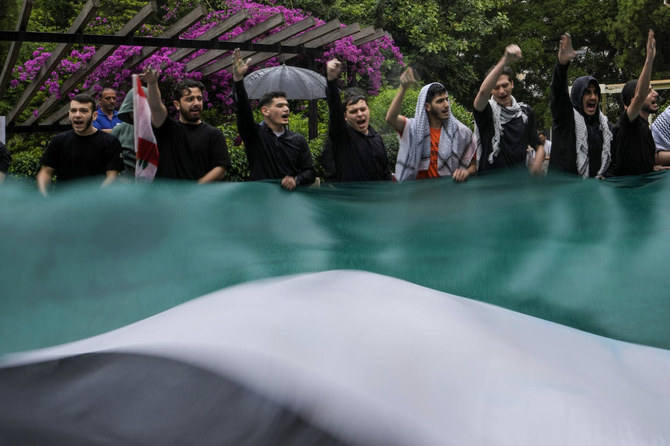
- Students at Al-Nahrain University waved the Palestinian and Iraqi flags
- Iraq does not recognize Israel while all Iraqi political factions support the Palestinian people
BAGHDAD: Dozens of Iraqi university students and professors rallied Thursday at a Baghdad campus in solidarity with Gaza and pro-Palestinian protests at US universities, AFP correspondents said.
Iraqi Education Minister Naeem Al-Aboudi earlier this week expressed his support for the “free voices in universities” around the world, and called for protests in solidarity with the embattled Gaza Strip.
Students at Al-Nahrain University waved the Palestinian and Iraqi flags.
“With all that is happening to our people in Gaza... of course I must be among the first to come to raise our voice,” student Aya Kader, 20, said.
“It is very positive to see the Palestinian flag being waved at American universities,” she said.
Weeks-long pro-Palestinian protests that have swept campuses across the United States have “encouraged us,” she added.
Students and professors also carried banners calling for a “free Palestine,” with some wearing the keffiyeh scarf that has long been a symbol of the Palestinian cause.
“We are here to tell them to stop the killing and to thank the free voices around the world,” said Professor Jomaa Salman, head of the engineering faculty.
“If the storming of Columbia University had happened in another country, especially in a third world country, they would have moved heaven on earth.”
The Iraqi embassy in Washington called Wednesday for “restraint, calm, respect for human rights and peaceful expression” as unrest over Israel’s war in Gaza simmered on US campuses.
Iraq does not recognize Israel while all Iraqi political factions support the Palestinian people.
In 2019, popular protests broke out in Iraq against the ruling establishment, and a security crackdown left more than 600 people killed.
The United States is Israel’s largest military supplier.
Student protesters on American campuses say they are expressing solidarity with Palestinians in the war-devastated Gaza Strip, prompting large-scale police arrests.
The Gaza war broke out after the unprecedented October 7 Hamas attack on southern Israel which resulted in the death of 1,170 people, mostly civilians, according to an AFP tally based on Israeli official figures.
Vowing to destroy Hamas, Israel retaliated with a massive offensive that has killed at least 34,596 people in Gaza, mostly women and children, according to the health ministry in the Hamas-run territory.
Militants also seized hostages during the attack, estimating that 129 of them remain in Gaza, including 34 the military says are dead.
UAE FM discusses Gaza with Israel’s opposition leader
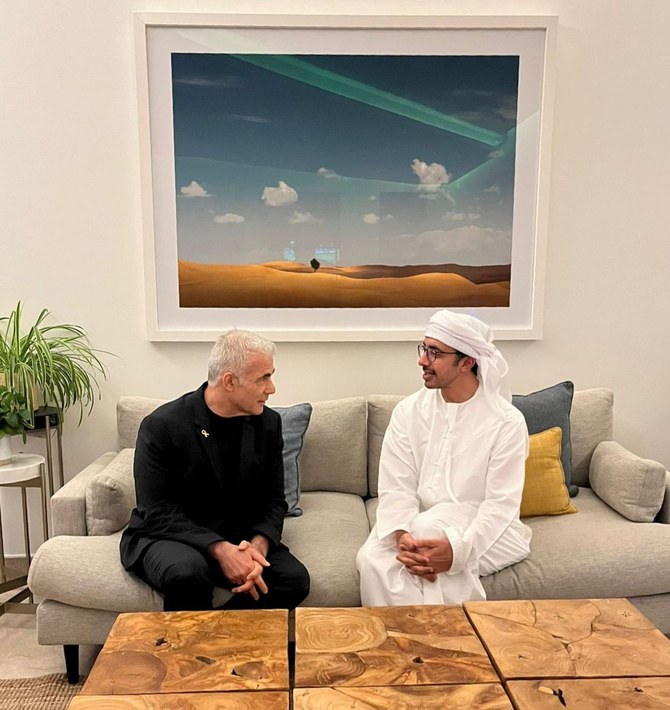
- Sheikh Abdullah stressed the need to restart talks on the two-state solution in Palestine
ABU DHABI: The UAE’s Foreign Minister Sheikh Abdullah bin Zayed Al-Nahyan held discussions on developments in Gaza with Israel’s opposition leader Yair Lapid in Abu Dhabi, Emirates News Agency reported on Thursday.
During the meeting, Sheikh Abdullah stressed the need to restart talks on the two-state solution in Palestine, which he said would ensure permanent regional peace and security.
He called for additional efforts to reach an immediate ceasefire in Gaza, which would prevent the conflict spreading to the rest of the region.
Sheikh Abdullah added that it was important for aid to reach Gaza, and that the lives of civilians should be protected.



